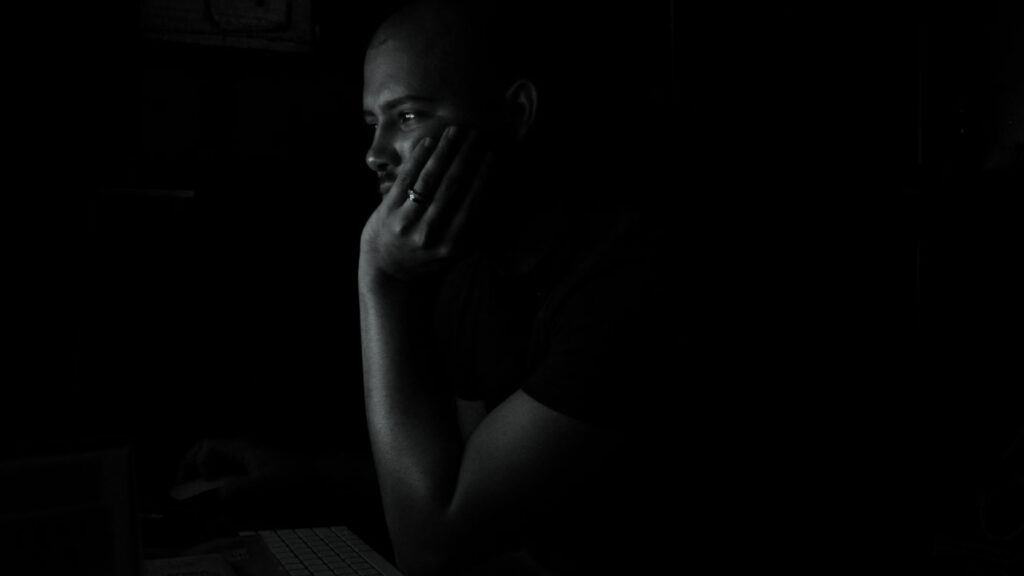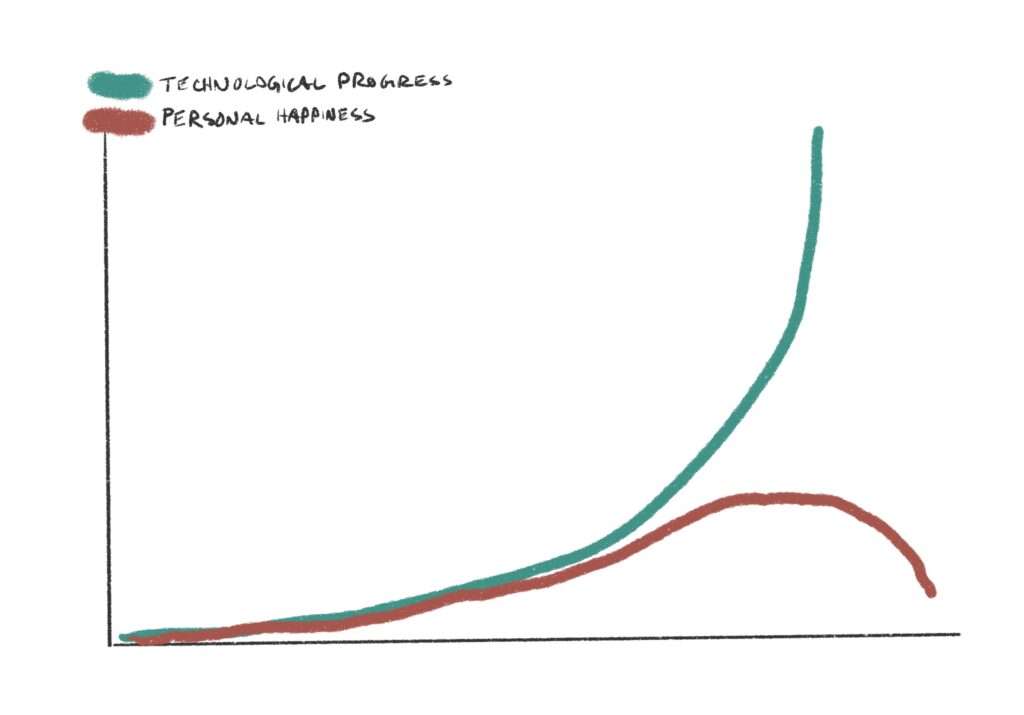Every device you buy makes a promise, “I’ll make your life easier.”
You see a new phone, a new appliance, or a new app you’d like to try, and immediately you start thinking, “this will make my life so much better!”
And often the promise turns out to be true.
We purchase that new gadget or piece of software and it does make us marginally more productive, entertained, or efficient. Life is a little bit easier. But while we’re so enamored by the ways the technology makes life easier, we scarcely hear the second part of the contract.
Technology will make your life a little easier, but it will also make it a little more meaningless.
The Future Is Here and It’s Disappointing
We are living in the future. At the press of a button, you can have any item you desire shipped to your home, any information you like poured directly into your brain. We have an abundance—endless entertainment options, unlimited methods to automate away tedium, and infinite access to every comfort imaginable. All thanks to our devices.
But our devices also take their pound of flesh. Do you ever look around at our world and wonder, “How can a people who have everything be so miserable?”

It’s the conundrum of our age: We have everything we thought we wanted, but somehow we’re still not happy. We have infinite content, so why aren’t we infinitely content?
Now, we could say the very obvious thing. They need, Jesus. And, yes, they do need Jesus.
But don’t you feel it too?
I know I do. And I have Jesus. But something still seems off. It’s like I’m desperately trying to get something from my devices; to scratch some mysterious itch. But the more I search, the more it eludes me.
The Life We’re Looking For
In his book, The Life We’re Looking For, Andy Crouch notes some of the unique features of the times we live in:
- “The defining mental activity of our time is scrolling”
- “The defining illness of our time is metabolic syndrome”
- “The defining emotional challenge of our time is anxiety”
Crouch concludes, “So it is no wonder that the defining condition of our time is a sense of loneliness and alienation. For if human flourishing requires us to love with all our hearts, souls, minds, and strength, what happens when nothing in our lives develops those capacities? With what, exactly, will we love?” (59).
“We’ve got the whole world at our fingertips, yet the relationships that give life meaning and purpose seem more distant than ever.”
It seems we’ve struck a deal with our devices that so much resembles the bargains with the tricksters from the old stories. A genie appears to grant your wish. But once you have what your flesh desired you find you’ve lost something of yourself in the exchange. We wished for peace and quiet, and what we got was loneliness. We wished for the world at our fingertips, but what we got was all the world’s anxieties. We wished to banish boredom and difficulty, but what we got was meaninglessness.
And the source of this emptiness seems to be that our devices which promise connection to others often act more like a wedge, pushing themselves between us and other people, isolating us by preying on our addiction to novelty.
We’ve got the whole world at our fingertips, yet the relationships that give life meaning and purpose seem more distant than ever.
“What, are you Amish or something?”
The need of our day, I believe, is a much more intentional relationship to technology. A relationship that prioritizes actual relationships. We need to have a willingness to be left behind. For all the ways it makes us more productive, we need to be honest about the ways technology takes as much as it gives.
In my book, A Student’s Guide to Gaming, I argue that one of the reasons Christians should be cautious with modern video games isn’t because they are bad, but because the games are too good. We all appreciate the need for caution when it comes to addictive substances like alcohol and tobacco. But I think this principle holds true for technology as well.

A Student’s Guide to Gaming
Video games are multi–billion–dollar industry. It seems that everyone is gaming in one way or another. You might not think that the Bible has anything to say about gaming, but this helpful book shows what a responsible relationship with gaming should look like for believers.
Learn MoreWe scoff at anyone who expresses the slightest concern at our state of device dependence, “What, are you Amish or something?” But behind that is the assumption that newer is always the better. As if there’s no real difference between having a telephone in your home and a tiny supercomputer in your pocket full of apps purposefully designed to addict you. That would be like saying there’s no difference between heroin and fentanyl, which is 50 to 100 times more powerful than heroin. You can pick your poison, but one’s a lot more poisonous.
Depends on How You Define Progress
Here’s the fallacy: We confuse the progress of technology in terms of its capabilities with its progress in terms of how it actually improves our lives. We assume a device with better specs = more happiness for me. But if better technology always made our lives better, then we should be seeing record levels of happiness. But it’s precisely the opposite of what we’re seeing. Instead, while the processing power and ingenuity of technology improve exponentially its ability to actually make our lives holistically better seems to be returning negative results.

When I look at my reading habits, my relationships, my productivity, or my spiritual disciplines ten, or even just five, years ago, I’m not sure how much all the new technology has actually added to my life. I think because of all the time I spend on my devices, I’ve actually put less time into those things than I did before.
What’s the net benefit of having all this tech? If we were to somehow quantify the ease our devices have added to our lives and subtract the relational damage they have done, would the result be a positive or a negative number?
Or worse yet, what if all this distraction is making us less godly? What if our love of the latest technology is just covetousness run amok?
And he said to them, “Take care, and be on your guard against all covetousness, for one’s life does not consist in the abundance of his possessions.”
Luke 12:15
In the end, who cares how productive that device makes you if you aren’t productive in what matters most to God. How will we love the Lord with all our heart, soul, strength, and mind, and love our neighbors as ourselves with our faces constantly pressed against a screen?
Sure, the latest technology makes our lives easier, but is it also making them more meaningless? And if it is, where do we start drawing the line?


Super meaningful and thoughtful words here. I’m being convicted lately of how I spend time and seeing the [lack of] fruit coming from too much time on social. I’m lonelier and more isolated than I’ve ever been, yet my screen time and online interactions are higher than ever.
I’m often convicted about this as a parent. I can be intentional with how I’m limiting my children’s adoption and usage of electronics, but completely ignore the fact that they see me walk around with my phone in hand, pocket, or illuminating my face at all hours of the day.
Spot on!! Yes. Drawing the line is the key and that is where God’s wisdom is needed. I am so thankful for reading this exhortation Reagan. Technology made our lives easier but nevertheless very burdensome. Both kids and adults are unable to cope up with the speed of change and are feeling left behind, which In turn is impacting our self esteem where in reality our worth lies in Christ and His righteousness. Thank you for the gentle reminder to slow down, breathe, and rest in God.
What a great article. Thank you for spelling it out. I’m a doer, and very happy completing tangible projects, and yet I still need this reminder. I’m sharing it….. on a device…
P.S. I’m trying to save this to my Pinterest so I can find it again, and it keeps telling me the image is too small. Could you perhaps add a graphic that is 900w x 1200h px ?….